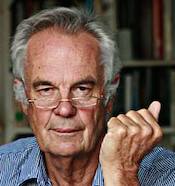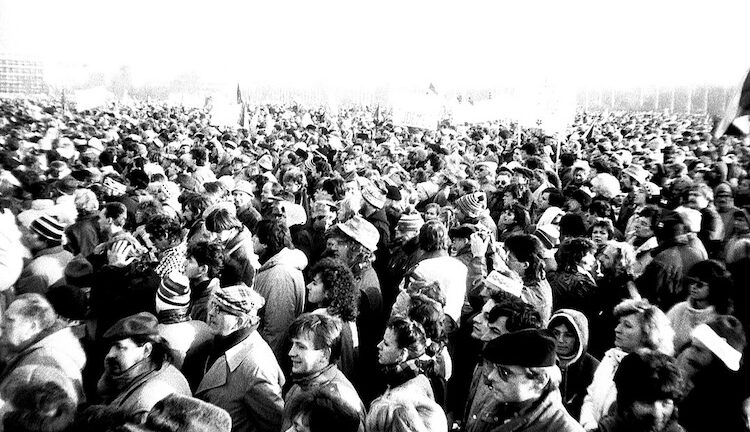By Jonathan Power*
LUND, Sweden | 9 September 2025 (IDN) — Is it too late to say non-violence would have served the Ukrainians better? Probably yes, although it shouldn’t be discounted.
This war with Russia reminds me of 1968, when the Soviet Union sent its tanks into Budapest to overthrow a reforming (but still communist) government, only to meet defiance from large sections of the population.

On both occasions, the brutality was met not with guns, petrol bombs and stones but with non-violence and passive obstruction. It worked. Stones, fire-bombs and gun-fighting would have been counterproductive.
The combined strength of the troops of the Soviet Union and its allies was 500,000. For six days, the Czech people met their invaders as fellow communists face to face, sometimes arguing with them, sometimes scorning them, always resisting them and refusing to obey their orders.
The reaction was totally spontaneous. The improvised radio broadcasts during the first hours of the invasion simply told the populace not to use force and to keep calm.
Slogans were painted on the walls and tanks, and the removal of street signs must have made it clear to many Soviet soldiers that things were not quite as they had been told. When the tanks tried to cross the railway lines, the barriers came down. When the Soviets turned up at local Communist Party meetings, the last business was read out and the meeting closed.
Resistance through radio and television
One of the most remarkable aspects of the resistance was the part played by radio and television. Not only were they a vital link to the outside world, which made the Russians realise they were playing to a world stage, but they also became almost the guiding hand of the Czech people.
Perhaps the most dramatic directive the Czech radio gave to the passive resistance campaign was an appeal to delay the Russian train carrying radio jamming equipment. As a result, the train was first held up in a station, then stopped on a main line because of a “failure” in the overhead electricity supply. Finally, it was routed onto a branch line with immobile locomotives blocking its way at each end.
So practical were the non-violent activities that the occupiers began rotating their troops—a clear sign that they were worried about the demoralising effect that the resistance was having on their men. Indeed, some Russian soldiers who were known to be alive were declared dead to their families: they had seen or said too much and were sent to the far end of the Soviet Union.
Although non-violent resistance had never before occurred on such a scale and with such effectiveness in a country under military occupation, it was not enough. The backbone of the resistance did eventually collapse. Nonetheless, much was achieved that would have been considered impossible on the morning of the invasion.
Some of the liberal reforms remained intact. More importantly, the workers continued for a long time to refuse to help the regime imposed by Russia out of its economic difficulties. Not overtly but, for instance, by making a virtue out of absenteeism, turning up for a week’s work on Monday lunchtime and knocking off on Friday lunchtime.
The political price the Kremlin had to pay was exorbitant — a breaking of the ranks by many of the world’s Communist Parties, including the important Italian, British and Spanish ones. There was disillusionment among most of Europe’s left-inclined intellectuals. Not that everybody in the Soviet orbit was happy with the invasion in the first place but what forced even some of the Kremlin’s friends into public disagreement was the widespread popular non-violent resistance.
Finding a new confidence
Perhaps the most important result was that the Czechs found a new confidence in each other. Later, the Czechs, along with Solidarity in Poland, which also employed non-violence to significant effect, played a crucial role in ending Soviet power in Eastern Europe.
Violence is not winning the war for Ukraine. How could one say that with so many dead and so much destruction? Even if the present negotiators could bring an end to the fighting, it would not bring lasting peace.
Non-violence should be given more thought before the war is lost. If I were President Volodymyr Zelensky, I would invite Lech Wałęsa, the leader of Poland’s shipyard workers (later the president of Poland), who led the core of Solidarity together with Jesse Jackson and Andrew Young, Martin Luther King’s closest aides, to come to Kyiv to give advice.
*Jonathan Power has been an international foreign affairs columnist for over 40 years and a columnist and commentator for the International Herald Tribune (now the New York Times) for 17 years. [IDN-InDepthNews]
Copyright © Jonathan Power
Visit www.jonathanpowerjournalist.com
Image: The Velvet Revolution in Prague. CC BY-SA 3.0

